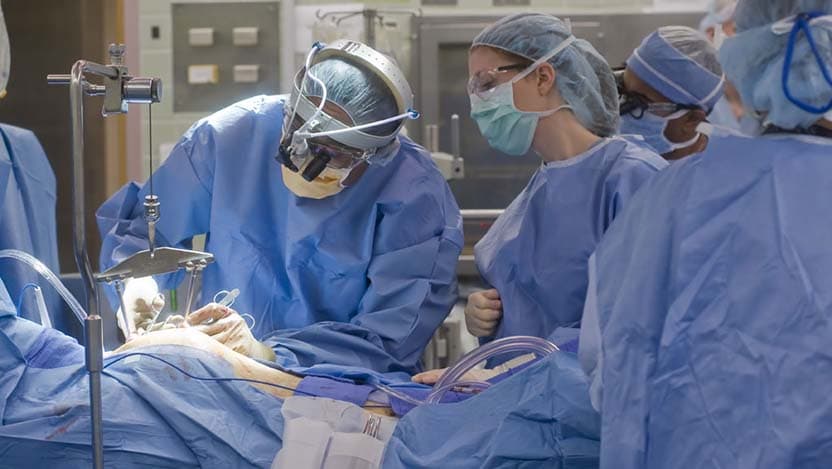UChicago Medicine's heart transplant program makes history again, with best survival rates and wait times ever recorded

The University of Chicago Medicine's heart transplant program is making history once again.
The program's transplant survival rates and transplant wait times are not only the best in the country, but they're the best in the history of heart transplantation, according to an analysis of Scientific Registry of Transplant Recipients (SRTR) data.
"This is an incredible accomplishment," said Valluvan Jeevanandam, MD, Director of the UChicago Medicine Heart and Vascular Center. "UChicago Medicine continues to be one of the top places in the world to receive a heart transplant, the culmination of many years of investment and development in its program. "
In the July 2022 SRTR report, UChicago Medicine's wait time for a heart transplant fell to 0.7 months, down from 1.1 months just two years ago, the SRTR data showed. The national average is 4.9 months.
The wait times are low because UChicago Medicine has so much experience with difficult and unusual cases, including bloodless surgeries and transplants in highly sensitized patients. This expertise allows them to safely and effectively utilize a wider pool of donor organs, including some that other facilities might choose to forego.
UChicago Medicine has ranked as the best in the nation in the time-to-transplant category for the last three consecutive SRTR reporting periods, as it has in other categories including best survival rate and lowest hazard ratio (the odds of having a complication).
We know from listening to patients that, what matters most to them is how long they will have to wait to receive a transplant. We’re thrilled that we’ve been able to achieve the shortest wait times in the country due to great teamwork and our ability to successfully transplant organs that other programs were not willing to accept.
Less than 10% of the nation’s 137 heart transplant programs have a 100% survival rate, and UChicago Medicine is in that elite group. It has received the SRTR’s 5-star rating for 100% survival rates in the past three reporting periods. The heart transplant programs at other Chicago hospitals have a survival rate of 90% or lower, the SRTR data showed.
The success of UChicago Medicine’s heart transplant program has had a positive impact on all of the hospital’s cardiovascular care, Jeevanandam said.
“That infrastructure and culture of excellence that we have created has a halo effect. If someone comes here for regular cardiac surgery, such as a bypass or a valve replacement, they’re getting the same infrastructure that has produced the best transplants in the U.S.,” Jeevanandam said. “Our survival rates and wait times just keep getting better. It’s why we get referrals from all over the country.”
The number of heart transplant surgeries performed at UChicago Medicine has steadily increased over the years, making it a top eight heart transplant program in the country in terms of volume, according to SRTR data. UChicago Medicine hit a record-high 61 transplants in 2021, a 36% increase over the previous year, and is on track to perform 70 heart transplants in 2022. The 2021 figure set a state record, surpassing the high-water mark set by Northwestern Medicine with 56 heart transplants in 2018.
The increase is attributed to several factors, including local outreach, new approaches for patients not considered transplantable elsewhere, complex patient referrals from other programs, and referrals for bloodless surgery, multi-organ transplant and congenital heart disease.
SRTR found UChicago Medicine to be top in the U.S. in other categories as well, including:
- The largest percentage of African American heart transplants. The new SRTR data shows that 42.9% of its transplants were for African American patients, far surpassing the national average of 28%.
- The lowest hazard ratio (the odds of having a complication). At 0.25, the ratio is not just best in the nation, but five times better than the other major hospitals in Chicago.
UChicago Medicine has a long history of transplantation breakthroughs dating back more than 115 years. In 1904, a cardiac surgeon developed the technique for joining severed ends of blood vessels together, a procedure that eventually made organ transplantation possible. The medical center continued advancing the field by pioneering the study of bone marrow transplantation and performing the first successful living-donor liver transplant in the world, first segmental and split-liver transplants in the U.S., and the first pancreas transplant in Illinois.
In 1999, UChicago Medicine performed the first successful heart-liver-kidney transplant in history. Then in 2018, its transplant team performed the world’s first back-to-back triple-organ transplants to replace two patients’ failing hearts, livers and kidneys. (UChicago Medicine has performed one-third of the country’s 39 heart-liver-kidney transplants.) And in 2020, it performed one of the country’s first transplants on a patient who required a new heart because of damage from COVID-19.
The SRTR is an organization contracted by the Dr. Valluvan Jeevanandam specializes in the surgical management of heart failure, and is an expert in high-risk cardiac surgery. He has performed more than 1,000 heart transplants — including the total artificial heart — and countless cardiac surgery procedures. At the University of Chicago Medicine, we bring the best minds in medicine together to meet the needs of patients facing heart failure and transplant.
Valluvan Jeevanandam, MD

Heart Failure and Transplantation
